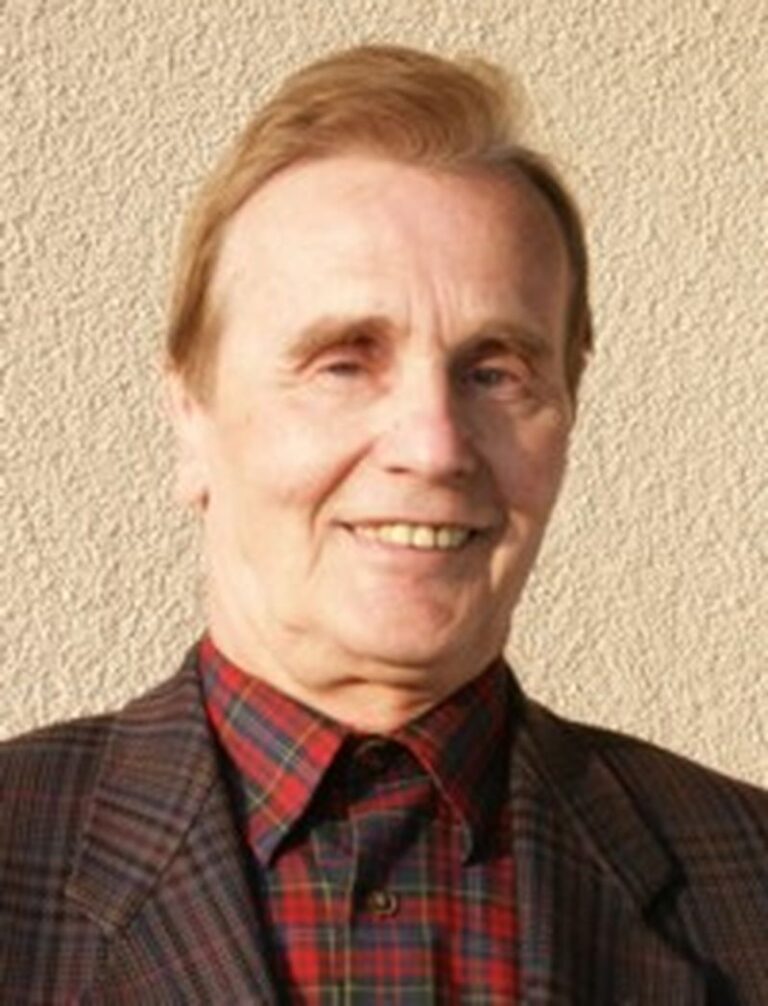Romuald Twardowski

Composer and teacher; b. 17 June 1930 in Vilnius. In 1952-57 he studied piano and composition in the class of Julius Juzeliunas at State Conservatory of the Lithuanian Republic in Soviet Union in Vilnius. In 1957-60 he continued his composition studies with Bolesław Woytowicz at the State Higher School of Music in Warsaw. In 1963 and 1966 he studied Gregorian chant and medieval polyphony under Nadia Boulanger in Paris. In 1972-2008 Romuald Twardowski was a professor at the State Higher School of Music in Warsaw (currently Fryderyk Chopin University of Music).
He is a laureate of many awards and honourable mentions. He received the 2nd prize for Spring Songs and the 3rd prize for Song about the White House at the composition competition of the Polish Association of Choirs and Orchestras (1959), the 1st prize for Warmian Suite at the competition on the occasion of the 550th anniversary of the Battle of Grunwald (1960), the 1st prize for Nocturnes and Jawor songs at the competition of the Provincial National Council in Katowice, Polish Radio and the Polish Composers’ Union (1960), the 1st prize for Antifone per tre gruppi d’orchestra at the Youth Competition of the Polish Composers 'Union (1961), the 2nd prize for Bucolics at composition competition of the Polish Students’ Association, the 2nd place at the UNESCO International Rostrum of Composers in Paris (1963), the 1st prize for Sonetti di Petrarca at the International Composition Competition in Prague (1966), the 2nd prize for Tre studi secondo Giotto at the Artur Malawski Composition Competition in Kraków (1966), the 2nd prize for Impressioni fiorentini at the Grzegorz Fitelberg Composititon Competition in Katowice, the 2nd prize for Ode to Youth at the Composition Competition in Skopje (1969), the 2nd prize for Humorous Songs at the National Composition Competition in Gniezno (1972), the 2nd prize for Studium in a at the Karol Szymanowski Composition Competition (1974), the 2nd prize for Lamentationes (1981) and Allaluia (1981) at the Florilege Vocal de Tours International Competition, the 2nd prize for Piano Concerto at the composition competition of the Polish Piano Festival in Słupsk (1985), the 1st prize for Alleluia at the Composition Competition of the Polish Association of Choirs and Orchestras (1990), the AGEC award of the The European Choral Association – Europa Cantat for Little Concerto for mixed choir (1994), the 1st award for Osanna II (2010) and O Tiebie radujetsia (2011) at the 21st Century Russian Music for Children and Youth Composition Competition. He won numerous prizes at the Prince Rainier III International Composition Competition in Monaco: the 1st prize for The Sorcerer`s Statues ballet-pantomime (1965), an honourable mention for Cantus antiqui (1965), a special prize for Little Orthodox Liturgy (1968), the 1st prize for the Lord Jim musical drama (1973). The TV version of The Sorcerer`s Statues ballet received the Grand Prix at the Stockholm International Ballet Film Festival (1972).
Twardowski’s music covers a variety of genres and forms ranging from instrumental miniatures to concert forms, from vocal solo and choral cycles to operas and ballets. Although very modern (there have been numerous performances at the „Warsaw Autumn”), his music is very clear and communicative, full of internal drama and individual in its character. It constitutes an original phenomenon in post-war Polish music. His works have been performed all over the world, accompanied by dozens of reviews, statements and interviews. The composer has made many journeys all over Europe, Asia, Russia and Africa, promoting Polish music both in Poland and abroad. In the eighties he was at the forefront in establishing cultural contacts with Lithuania, Armenia and Georgia. He has been a jury member of numerous music competitions, including Varsovia Cantat and Cracovia Cantans. He has been the initiator of the “Hajnówka” International Festival of Orthodox Church Music and its jury chairman since 1983. In 2000 he released his autobiography Było, nie minęło: wspomnienia kompozytora [It Has Been, but It Is not Gone: Composer’s Memories], in which he summed up his creative experience and provided a colorful account of the people and events of the last several decades. In 2012 the State Primary Music School in Puławy took his name.
The composer received many orders and decorations, including the Knight’s Cross (1974) and the Officer’s Cross (1985) of the Order of Polonia Restituta, the Award of the Ministry of Foreign Trade and Maritime Economy (1980), the Włodzimierz Pietrzak Award (1983), the Prince Konstanty Ostrogski Award (1990), the annual award of the Polish Composers’ Union (1995), the first degree Order of Saint Maria Magdalena of the Polish Autocephalous Orthodox Church (1996), the Ignacy Jan Paderewski Award (2006), the Golden Badge with Diamond of the Polish Association of Choirs and Orchestras (2007), the Gold Medal for Merit to Culture – Gloria Artis (2010), the Honorary Badge of the Podlasie Voivodship (2010), the Jerzy Kurczewski Award (2015), the Honorary Badge of the National Music Academy of Ukraine (2015), the Special Award of the Minister of Culture and National Heritage (2015).
